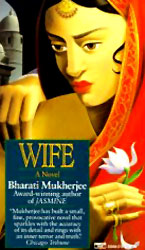Wife as the name suggests is the story of a wife. The novel centers on the character Dimple Mukherjee, who grows, matures, rebels, kills and finally dies in this novel. The title thus aptly echoes the storyline.
The Indian born American novelist Bharati Mukherjee is also known as short story writer, non-fiction writer as well as a successful journalist. Married to a Canadian writer she immigrated to Canada in 1968 and eventually a naturalized citizen in 1972. Bharati describes those 14 years of her life as the hardest one as she found herself discriminated against and treated as a member of the "visible minority." She has spoken in many interviews of her difficult life in Canada. This is the country that she sees as unfriendly to its immigrants and one that opposes the concept of cultural absorption. In spite of her tough life in Canada, which was challenging too she manages to write her first two novels, The Tiger`s Daughter and wife. At that time she was working up to professorial status at McGill University in Montreal. During those years she collected many of the sentiments found in her first collection of short stories Darkness. In many sections of this collection reflects her mood of cultural separation while living in Canada. Finally fed up with Canada, Mukherjee and her family moved to the United States in 1980, where she was introduced herself as a permanent U.S. resident. In 1986 she was awarded a National Endowment for the Arts grant. After holding several posts at various colleges and universities, she ultimately settled in 1989 at the University of California-Berkeley.
Synopsis:
 The central character of this fictional write-up of Bharati Mukherjee `Wife` is Dimple. Mukherjee presents this character of `Wife` in such a way that the reader is left wondering about the attitude that he or she develops towards her. Mukherjee takes us deep into the mind of Dimple as she makes a transition from being single to marrying a husband chosen by her father. It also depicts the transitional situation of living in the familiar surroundings of Calcutta to moving to the so-perceived violent city of New York. As the novel progresses, Dimple`s hidden unstable personality reveals itself leaving the reader shocked, yet filled with wonder and delight. The protagonist `Dimple` is characterized as a young, naive Indian woman, who tries to reconcile the Bengali ideal of the perfect, passive wife with the demands of her new American life. In this story Dimple lacks the inner strength and resources it takes to cope in New York City as the young wife in an arranged marriage. Again in this novel, Mukherjee deals with the complications that come from being thrown between two worlds and the strength and courage it takes to survive and in the end live. This story reflects the author`s mental status in many of its parts. At the end of the story being suppressed by such men and attempts to be the ideal Bengali wife she becomes frustrated and out of fear and personal instability she ultimately murders her husband and eventually commits suicide.
The central character of this fictional write-up of Bharati Mukherjee `Wife` is Dimple. Mukherjee presents this character of `Wife` in such a way that the reader is left wondering about the attitude that he or she develops towards her. Mukherjee takes us deep into the mind of Dimple as she makes a transition from being single to marrying a husband chosen by her father. It also depicts the transitional situation of living in the familiar surroundings of Calcutta to moving to the so-perceived violent city of New York. As the novel progresses, Dimple`s hidden unstable personality reveals itself leaving the reader shocked, yet filled with wonder and delight. The protagonist `Dimple` is characterized as a young, naive Indian woman, who tries to reconcile the Bengali ideal of the perfect, passive wife with the demands of her new American life. In this story Dimple lacks the inner strength and resources it takes to cope in New York City as the young wife in an arranged marriage. Again in this novel, Mukherjee deals with the complications that come from being thrown between two worlds and the strength and courage it takes to survive and in the end live. This story reflects the author`s mental status in many of its parts. At the end of the story being suppressed by such men and attempts to be the ideal Bengali wife she becomes frustrated and out of fear and personal instability she ultimately murders her husband and eventually commits suicide.
This non-fictional creature of Bharati Mukherjee is published by one of the famous publishing houses Fawcett.
The main character depicted in `Wife` is regarded as a weak one as she fails to make the transition from one world to another. The matchless storytelling method of Bharati Mukherjee` which contoured her later works is still seen in this particular novel.



















